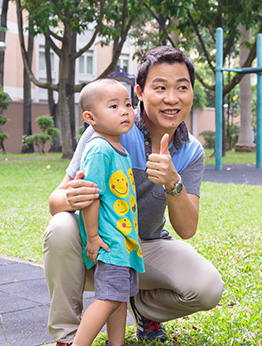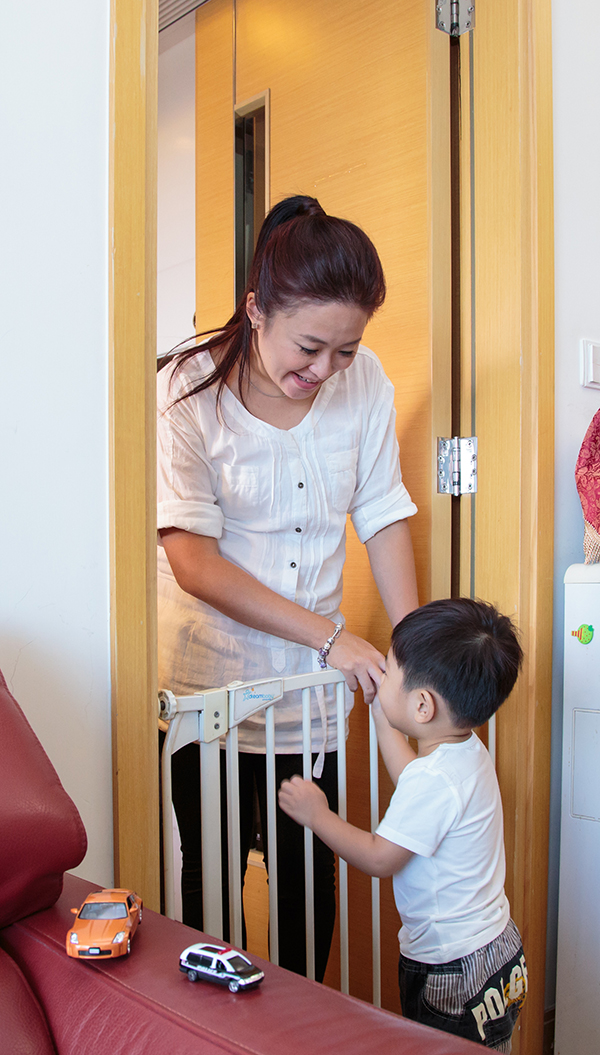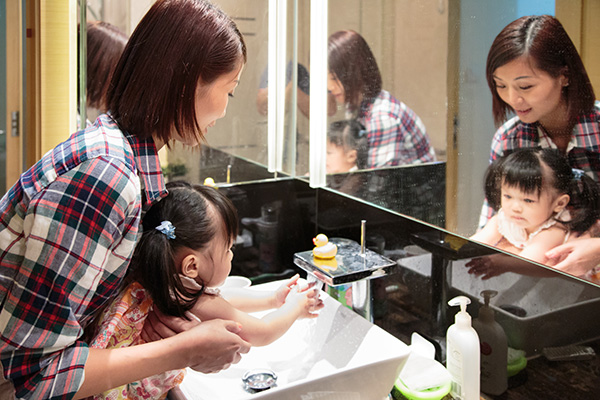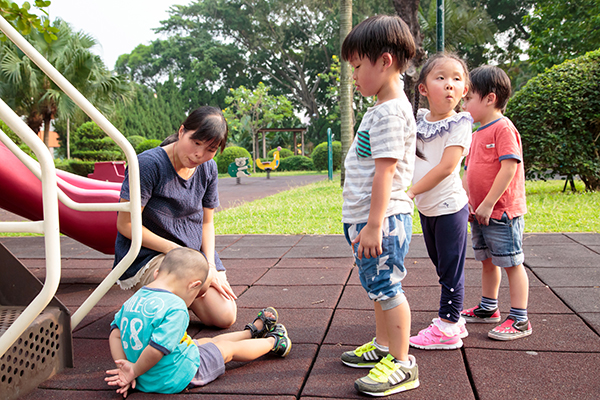Video
How to Discipline Toddlers in a Positive Way (Applicable to 18 – 24 Months Old)
Title: How to Discipline Toddlers in a Positive Way (Applicable to 18 – 24 Months Old)
Narrator: How to Discipline Toddlers in a Positive Way (Applicable to 18 – 24 Months Old)
Scene: Dad, Mum and Julian are playing with other kids in the playground.
Narrator: Starting from 1 year old, children thrive in their physical and language abilities. They start to test their own limits and yet, their logical reasoning and judgment are still immature. Undesirable behaviour does occur and therefore, your guidance is really important! The following keys to positive discipline will make your parenting easier and happier.
Heading: 1. Encourage and Praise Desirable Behaviour
Narrator: 1.Encourage and Praise Desirable Behaviour
Scene: Some kids are playing ball in the playground.
Narrator: You need to encourage your child for his positive behaviour and correct the undesirable. Then, he can learn which behaviour is desirable and which is not.
Scene: Julian picks up the ball and passes it back to the kids.
Narrator: Julian picks up a ball rolled to him and returns it to the kids at a football game. Seeing what Julian did, Dad praises him.
Heading: 2. Set Simple Rules
Narrator: 2.Set simple rules
Scene: When Dad and Julian are approaching the slide, Dad sets some rules with him.
Narrator: Setting simple rules helps your child understand and follow your expectations. At the same time, you need to be his role model.
Narrator: Dad sets up some rules with Julian before letting him play on the slide, like “going home after playing 2 times”.
Heading: 3. Guide Your Child to Follow the Rules
Narrator: 3. Guide your child to follow the rules
Scene: Julian stands in the way of others on the slide
Narrator: When your child disobeys the rules, you need to stay calm, say “no” to him with a firm facial expression and a “no” gesture. It doesn't mean that you need to yell.
Scene: Julian sits on the ground and obstructs other kids playing on the slide.
Narrator: Julian sits on the ground and obstructs other kids playing on the slide. Mum asks him to get up and not block the way.
Scene: Julian follows Mum to the queue. Mum pats his head and praises him.
Narrator: Remember to praise your child if he listens and follows the rules.
Heading: 4. Correct Dangerous Acts Promptly
Narrator: 4. Correct dangerous acts promptly
Scene: Julian is playing on the slide with other kids.
Narrator: Stop your child's dangerous acts promptly.
Scene: After sliding down, Julian tries to climb up the slide instead of the stairs. Mum stops him.
Narrator: After sliding down, Julian tries to climb up the slide instead of the stairs. Mum stops him. He looks upset and starts throwing a tantrum.
Narrator: When toddlers disobey and throw a tantrum, you can deal with it such as by simple distraction.
Narrator: Positive discipline means using assertive and non-harmful ways to help your children develop good behaviour. Concerted effort from all caregivers contributes to its success and effectiveness.
End Shot: Department of Health logo
The Department of Health owns the copyright of this digital video.
This digital video is produced solely for non-commercial use.
It should not be rented, sold or otherwise used for profit-making purposes.
Is it too early to discipline a toddler?
From about 1 year of age, with the development in mobility, language and cognitive abilities, along with a growing sense of autonomy, your toddler may start to have uncooperative moments. While this is an inevitable stage of development, it is also time for parents to start disciplining the child, help her learn to follow rules and cooperate through appropriate guidance, while supporting the development of self-control.
The core principle of positive discipline is to guide and encourage your child in a loving and respectful way, in order to nurture her virtues and values. When parents discipline your child in a gentle but firm way based on her unique characteristics, you are supporting your child's healthy development while you will also get along better.
Will limit setting hinder children's development of autonomy?
To develop autonomy, children need opportunities to make their own decisions. By setting clear and consistent limits for your child, he may explore freely under safe and appropriate conditions without needs for frequent parental intervention; you and your toddler will both feel safe while his sense of autonomy will be fostered. Your guidance can also help him understand what behaviours are appropriate, and adjust socially in groups. For instance, when you visit a children's play room with your child, you may let him explore and play freely as long as it is safe. When necessary, guide him to line up for or take turns to use the play facilities.
Children can be overwhelmed by too many rules and limits. There are times when you can encourage your child to develop autonomy and problem-solving by allowing him to make age-appropriate decisions. For example, you may let him explore different ways to play with a toy within reasonable limits, or choose his preferred clothes or snacks from the choice of a few.
Is spanking or threatening more effective?
Spanking or threatening may stop your child from misbehaving immediately. However, without teaching him how to behave appropriately, he will repeat the undesirable behaviour shortly .
Besides, a toddler's memory span is short and he may soon forget this unpleasant consequence, or misbehave again because of his limited self-control. Moreover, he may learn from you to solve problems through physical aggression.
I have tried to apply “Positive Disicipline” but my child is still not cooperating!
Given the developmental characteristics of children at this stage, even if parents have used appropriate and effective discipline strategies, children will inevitably be uncooperative at times, and parents may feel angry, upset, or frustrated. However, positive parenting helps parents guide their child's behaviour in a way that is not hurtful to the child and parent-child relationship.
The process of discipline does not happen overnight. In addition to managing your child's behaviour, by consistently guiding him to cooperate in a positive way, you can also nurture his confidence, self-control and problem-solving skills.
Praise Desirable Behaviour
Apart from correcting undesirable behavior, you need to praise and encourage your child when she behaves. For instance, you can praise your child “you stay in the seat when you eat, good girl!” or “you take off your shoes on your own, great job!”. When you praise your child, try to concretely describe your child's desirable behaviour; you may also praise her for good attitude or character shown in the process. Through such praises, you can teach her what behaviours are appropriate, encourage desirable behavior while promoting her self-image. Your verbal praises can also be coupled with the following actions:
- Looking and smiling at her
- Touching gently
- Embracing and hugging
- Kissing
- Applauding

Set Simple Rules
Simple rules can help your child understand the expectations and limits on their behaviour, making it easier for him to follow.
- Define clearly areas in the house where your toddler cannot enter, e.g. the kitchen.
- Use positive wordings, e.g. “finish your meal before you leave the seat” is easier to follow than “don't leave without finishing your meal”.
- Set 3 to 4 simple rules that match with the child's age and ability.
- All caregivers should consistently follow through the rules set.
Here are some examples of age-appropriate rules:
- Stay in seat during the meal; finish the meal before leaving the table;
- Hold adult's hand when going out;
- Only adults can enter the kitchen;
- Only adults can turn on electrical appliances, including TV;
- Wash hands before eating;
- Put away the shoes after taking them off, etc.


Guide Your Child to Cooperate
When your child does not follow instructions, stay calm and firmly ask her to stop the inappropriate behaviour or repeat your instruction. In some cases, children are more likely to struggle with instructions or behave inappropriately, for instances, when they have nothing to do or get impatient when told to wait, or when they are so engaged in their play and have difficulty taking turns, sharing or leave with their parents. In such cases, parents may guide the child to cooperate by using distractions.
For example, after playing in a park for some time, your child refuses to leave with you as instructed, you may then talk to her, face to face,
“You want to keep playing here, there is something interesting over there, let's go check it out”
You may carry your child, chat and laugh with her while you leave.
Here are some common ways for parents to distract or redirect:
- Suggest your child to observe interesting things around you, such as pointing out some uncommon cars while waiting for a bus.
- Ask her to do something else that is appropriate, e.g. when she is bored and starts messing around at home, give her a toy to play with
- Make what you are doing fun, such as asking her to help find her favorite fruits and vegetables when you are shopping at the supermarket
- Talking, singing or playing with your child
- Bring her out of the scene, for example, if your family is dining out, take her out for a walk after she has done eating
Distraction may prevent your child from having more inappropriate behaviours or negative emotions. However, if your child is already experiencing strong emotions or behaving in a dangerous or aggressive manner (such as getting into a fight with other kids), parents have to respond directly to her emotions and behaviours, in order to help her learn right from wrong and get along with others. Parents may refer to the following Keys (4) and (5) and provide guidance to encourage good behaviour.
Correct Dangerous Acts Immediately
You have to stop any dangerous acts of your child immediately and teach him before redirecting his attention to some other interesting and safe activities, e.g.,
- “The socket is dangerous. Don't touch. Come and play with mummy.”
- “You may fall and hurt yourself if you climb up. Come down and play ball with me.”
Deal with Undesirable Behaviour
Intentions behind the behaviour
As mentioned before, children at this stage are growing rapidly in different areas; at the same time, they lack safety awareness and are just starting to develop language and self-control abilities. With these developmental characteristics, children may easily throw tantrums and behave inappropriately, such as screaming, throwing things, running around, drawing on or breaking toys or other things, etc.. Such behaviour reflects the children's “needs” in exploration and autonomy, as well as “difficulties” in self-control and problem-solving.

If you can remain gentle but calm, and handle your child's behaviour positively, these behaviours will improve eventually, while the development of her self-control ability is supported.
How to deal with children's undesirable behaviour?
If your child has a temper tantrum because he is upset, parents can respond to your child's feelings with “emotion coaching”, before dealing with his behaviour or solving the problem. By sensitively observing and describing your child's feelings and needs, you can help him settle more quickly, promote his emotion-regulation skills, and enhance your parent-child relationship. When your child is relatively calm, parents can repeat rules or instructions. When your child is willing to cooperate, don't forget to praise him!
For instance, when your child refuses to have a bath because he wants to keep playing, and starts throwing toys in a tantrum, you may first calmly stop him from throwing toys (because it could be dangerous), then hold him gently, gaze at him and say, “you haven't done playing yet, you are angry when I ask you to bathe, as you can't keep playing!” Parents may pay attention to your child's responses and continue to describe his possible feelings and thoughts. When he is less emotional, you may restate rules and set limits, such as, “no throwing of toys even when you are angry, now let's tidy up,” or “you still want to play, and it's time for a bath, how about we play with the boats when you bathe?”
To learn more about responding positively to children's emotions, check out the video and pamphlet on “emotion coaching”.
Parents may also distract your child after responding to his emotions, for example by pointing out other interesting things, redirecting his attention to other games or activities, or bring him away from the scene that triggers his inappropriate behaviour.
Positive discipline is using constructive and non-hurtful ways to develop desirable behaviours in your child. How can parents do that? Read on about the following keys:
- Praise Desirable Behaviour
- Set Simple Rules
- Guide Your Child to Cooperate
- Correct Dangerous Acts Immediately
- Deal with Undesirable Behaviour
To make the above 5 keys effective, parents need to implement them persistently and consistently!

